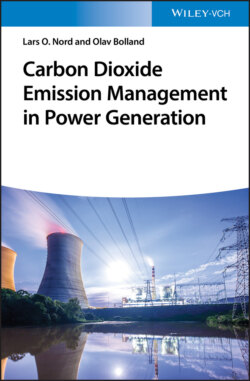Читать книгу Carbon Dioxide Emission Management in Power Generation - Prof. Lars O. Nord - Страница 20
1.6 Fossil Fuel Resources
ОглавлениеAre we going to run out of fossil fuels soon? The answer is most likely no!
We are depleting the fossil fuel resources at an increasing rate. Nevertheless, there are still huge resources of coal and significant resources of oil and natural gas (Brandt and Farrell 2007; Chu and Goldemberg 2007; Freund and Kaarstad 2007). Both the amount of remaining resources and what is economic to produce have changed over time. It is hard to predict for how long there will be fossil fuel resources that are economic to produce. This mainly depends on fuel prices, cost of production, and environmental limitations, such as emissions of CO2.
It should be noted that the technical challenge of producing fossil fuels is increasing. The resources that are easy and inexpensive to produce are the first to be exhausted, then comes the time of the more difficult ones. There is, however, no clear-cut transition between types of production, as one sees various kinds of ongoing fossil fuel production. Examples of resources from which it is difficult to produce are Canadian oil sand and Venezuelan heavy crude oil. The production of oil in these two examples requires a lot of expensive processing and use of energy before it can be fed to refineries. Other examples are oil shales, coal seams under the seabed, and natural gas hydrates. As the production on average becomes more difficult, there will be an increase in energy use and CO2 emissions from the production of the fuels.
Production from gas shales, particularly in the United States, has changed the North American natural gas market with significant price drops. It is likely that unconventional gas will increase in importance, not just in the United States but also in other parts of the world.
If proponents of peak oil 3, such as Laherrère, Campbell, and Deffeyes (Swenson 2008), are correct, the predicted peak in oil production will take place before 2020 (Al-Husseini 2006). It is disputed whether this is likely. Even if this is the case, there are still so many fossil fuel resources left that we will probably produce transportation fuels by coal-to-liquid conversion.
There is one very important conclusion: the lack of fossil fuels will not cause a reduction of CO2 emissions soon enough to avoid an unwanted high atmospheric concentration of CO2. This implies that we cannot simply sit back and relax, waiting for the fossil fuels to be exhausted and let the problem with man-made climate change go away by itself.
